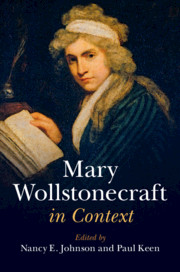Book contents
- Mary Wollstonecraft in Context
- Mary Wollstonecraft in Context
- Copyright page
- Contents
- Illustrations
- Notes on Contributors
- Preface
- Frontispiece
- Chronology
- Part I Life and Works
- Part II Critical Fortunes
- Part III Historical and Cultural Contexts
- The French Revolution Debate
- The Rights of Woman Debate
- Chapter 13 Jacobin Reformers
- Chapter 14 Liberal Reformers
- Chapter 15 Conservative Reformers
- Philosophical Frameworks
- Legal and Social Culture
- Literature
- Suggested Further Reading
- Index
Chapter 13 - Jacobin Reformers
from The Rights of Woman Debate
Published online by Cambridge University Press: 16 January 2020
- Mary Wollstonecraft in Context
- Mary Wollstonecraft in Context
- Copyright page
- Contents
- Illustrations
- Notes on Contributors
- Preface
- Frontispiece
- Chronology
- Part I Life and Works
- Part II Critical Fortunes
- Part III Historical and Cultural Contexts
- The French Revolution Debate
- The Rights of Woman Debate
- Chapter 13 Jacobin Reformers
- Chapter 14 Liberal Reformers
- Chapter 15 Conservative Reformers
- Philosophical Frameworks
- Legal and Social Culture
- Literature
- Suggested Further Reading
- Index
Summary
Barbara Taylor notes that though Mary Wollstonecraft is often seen as an “individual pioneer … setting her among her fellow radical literatae, the first coterie of women intellectuals to intervene in British reform politics, gives a truer sense of her historic significance.”1 This chapter investigates how Wollstonecraft’s life and professional practice entwined with those of three of her contemporaries, Mary Hays, Mary Robinson, and Charlotte Smith. The reception of reformist causes underwent a sea change during the 1790s, and I analyze how Wollstonecraft, Hays, Robinson, and Smith respond to such change. The first part explores the response to Wollstonecraft’s A Vindication of the Rights of Woman in 1792–93, when it is possible for Jacobin writers to celebrate and advance the “linked” causes of women’s rights and political reform.2 The second part investigates the period following Wollstonecraft’s death, from 1797–99, when anti-Jacobin reaction makes it difficult to advance any reformist cause, and the polemical writings and fiction of Wollstonecraft, Hays, Robinson, and Smith articulate a complication of, and even dissatisfaction with, earlier claims for equality.
- Type
- Chapter
- Information
- Mary Wollstonecraft in Context , pp. 111 - 118Publisher: Cambridge University PressPrint publication year: 2020
- 1
- Cited by

